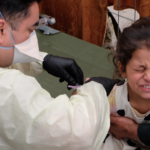Down the rabbit hole of BWC verification
By Malcolm Dando | January 25, 2010
Everyone is familiar with the nightmare in which they haven’t studied for tomorrow’s exam. As I’ve gotten older, and become a teacher myself, this nightmare has mutated into one in which I’ve forgotten to prepare the exam for my students! I recently had this nightmare in novel form on a subject I hold dear–international treaty verification.
The dream began with me walking the corridors of my university when my department administrator stopped me to ask about the status of an upcoming International Security 101 test. I told her that my colleague in the biology department was going to write two questions for the test, yet she hadn’t heard from him and the test was to be printed that day. I said that I was very surprised at this news, since my colleague had volunteered to prepare the questions, one rather straightforward on verification that all of the class could attempt and the other a more daunting one on the dual-use dilemma for anyone who wanted to try something more adventurous.
Although it’s naive to assume there is a single solution to the dual-use problem, a collaborative effort will greatly mitigate the risk that discoveries in the life sciences could someday be misused for hostile aims.”
We decided to recheck the administrator’s e-mail and noticed that my colleague had sent her one with the confusing subject line of “Going on vacation.” There was a document attached, which we hoped would clear up the situation. It read as follows:
DRAFT: International Security 101. Compulsory arms control questions: Question 1:
To verify, or not to verify–that is the question:
Whether ‘tis nobler in the mind to suffer
The slings and arrows of outrageous fortune,
Or to take arms against a sea of troubles
And, by opposing, end them.
Discuss, paying particular attention to comparisons and contrasts in the following two passages:
Passage A: President Barack Obama in Copenhagen (December 2009)
[W]e must have a mechanism to review whether we are keeping our commitments, and exchange this information in a transparent manner. These measures need not be intrusive, or infringe on sovereignty. This must, however, ensure that an accord is credible, and that we are living up to our obligations. Without such accountability, any agreement would be empty words on a page.
I don’t know how you have an international agreement where all are not sharing information and ensuring that we are meeting our commitments. That doesn’t make sense. It would be a hollow victory.
Passage B: Ellen Tauscher, U.S. Undersecretary for Arms Control and International Security in Geneva at the meeting of States Parties to the Biological Weapons Convention (December 2009)
The Obama administration will not seek to revive negotiations on a verification protocol to the Convention. We have carefully reviewed previous efforts to develop a verification protocol and have determined that a legally binding protocol would not achieve meaningful verification or greater security. It is extraordinarily difficult to verify compliance.
My administrator and I scrolled down the screen and found the next paragraph. It read: “I am a scientist. I cannot take any more of this nonsense. I’m going on vacation.”
A smile flickered across my administrator’s face as she asked me if I could provide the dual-use question. That’s when I woke up with a start, worrying about finding a suitable poetic verse to introduce it!
Now the problem with nightmares is that they tend to recur and that they don’t get any better. In fact, I can well imagine this one continuing with a cheerful university colleague entering the room and asking me, “What is your biology friend so worked up about?”
I would reply that considering the obvious contradiction between the two arguments about verification both produced by the same U.S. administration at different international meetings within weeks of each other, most scientists would prefer neat, tidy, and logical thinking, something that these statements lack. “But these were very different treaties under discussion, and there is no reason for the same argument to apply to both,” my colleague argues.
Becoming exasperated in the same way as my vacationing friend, I insist that the president wasn’t talking about just one international agreement, but about any international agreement. My colleague points out that Obama didn’t say any agreement, but an agreement, so my argument really doesn’t stand up logically. I insist that it’s the sense of the sentence rather than the individual words that are important when my administrator joins in. “In the second passage the undersecretary says that they have studied the question carefully and have come to the same conclusion as before. Their considered opinion is that the Biological Weapons Convention (BWC) is unverifiable through a legally binding protocol.”
At this point, I grind out my well-worn argument that the United States produced no empirical evidence to support that contention during the long BWC protocol negotiations in the late 1990s whereas its allies produced a series of working papers detailing inspection routines and concluding that they could be instituted without leaking government or industry secrets if well-known managed access procedures were followed properly. (Several working papers on the subject include WP.76, WP.77, WP.258, WP.298, WP.310, and WP.317.)
My colleague disagrees. “The United States has a perfectly sensible position that is set out in the undersecretary’s speech,” he insists, referring to a section not quoted in the exam question where Tauscher states that the United States, instead of verification, “believe[s] that confidence in BWC compliance should be promoted by enhanced transparency about activities and pursuing compliance diplomacy to address concerns.”
At this point, I explode, “Like the Confidence Building Measures that have been such a huge success during the last two decades?” I am referring to politically binding, but often ignored disclosure requirements for BWC States Parties that have been notable for their lack of high-quality data and low participation. My colleague laughs. “So you think there should be a legally binding protocol to the BWC?” He knows the answer I would give to that question (absolutely!), but before I can reply, my administrator adds drily: “I don’t think the Chinese would agree to that.”
Some may find my nightmare relatively benign by most standards. However, I find that nightmares are often useful in revealing our anxieties about very real concerns. And my frustration and fears over inconsistent, or nonexistent, verification of the BWC are very real. Yet I’m not without hope. My impression from talking to practicing life scientists around the world is that once they are aware of the dual-use potential of their work, they are more than willing to do what they can to prevent its misuse.
Scientists, however, trained to ask critical questions, expect other stakeholders–like BWC States Parties–to take seriously their responsibilities as well. Unfortunately, that isn’t the case today. Although it’s naive to assume there is a single solution to the dual-use problem, a collaborative effort will greatly mitigate the risk that discoveries in the life sciences could someday be misused for hostile aims.
Together, we make the world safer.
The Bulletin elevates expert voices above the noise. But as an independent nonprofit organization, our operations depend on the support of readers like you. Help us continue to deliver quality journalism that holds leaders accountable. Your support of our work at any level is important. In return, we promise our coverage will be understandable, influential, vigilant, solution-oriented, and fair-minded. Together we can make a difference.
Topics: Biosecurity, Columnists















